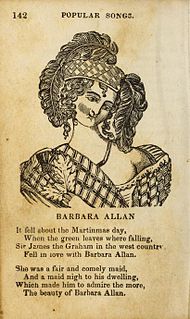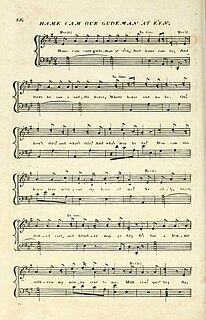Related Research Articles

"Barbara Allen" is a traditional Scottish ballad; it later travelled to America both orally and in print, where it became a popular folk song. Ethnomusicologists Steve Roud and Julia Bishop described it as "far and away the most widely collected song in the English language—equally popular in England, Scotland and Ireland, and with hundreds of versions collected over the years in North America."
"Lily of the West" is a traditional British and Irish folk song, best known today as an American folk song, listed as number 957 in the Roud Folk Song Index. The American version is about a man who travels to Louisville and falls in love with a woman named Mary, Flora or Molly, the eponymous Lily of the West. He catches Mary being unfaithful to him, and, in a fit of rage, stabs the man she is with, and is subsequently imprisoned. In spite of this, he finds himself still in love with her. In the original version, the Lily testifies in his defense and he is freed, though they do not resume their relationship.

"Matty Groves", also known as "Little Musgrave and Lady Barnard" or "Little Musgrave", is a ballad probably originating in Northern England that describes an adulterous tryst between a young man and a noblewoman that is ended when the woman's husband discovers and kills them. It is listed as Child ballad number 81 and number 52 in the Roud Folk Song Index This song exists in many textual variants and has several variant names. The song dates to at least 1613, and under the title Little Musgrave and Lady Barnard is one of the Child Ballads collected by 19th-century American scholar Francis James Child.
The Roud Folk Song Index is a database of around 250,000 references to nearly 25,000 songs collected from oral tradition in the English language from all over the world. It is compiled by Steve Roud, a former librarian in the London Borough of Croydon. Roud's Index is a combination of the Broadside Index and a "field-recording index" compiled by Roud. It subsumes all the previous printed sources known to Francis James Child and includes recordings from 1900 to 1975. Until early 2006 the index was available by a CD subscription; now it can be found online on the Vaughan Williams Memorial Library website, maintained by the English Folk Dance and Song Society (EFDSS). A partial list is also available at List of folk songs by Roud number.
"The Twa Sisters" is a traditional murder ballad, dating at least as far back as the mid seventeenth century. The song recounts the tale of a girl drowned by her jealous sister. At least 21 English variants exist under several names, including "Minnorie" or "Binnorie", "The Cruel Sister", "The Wind and Rain", "Dreadful Wind and Rain", "Two Sisters", "The Bonny Swans" and the "Bonnie Bows of London". The ballad was collected by renowned folklorist Francis J. Child and is also listed in the Roud Folk Song Index. Whilst the song is thought to originate somewhere around England or Scotland, extremely similar songs have been found throughout Europe, particularly in Scandinavia.

"Young Beichan" is a ballad, which with a number of variants and names such as "Lord Baker", "Lord Bateman", and "Young Bekie", was collected by Francis James Child in the late 19th century, and is included in the Child ballads as number 53.
"Sheath and Knife" is a folk ballad.
"Riddles Wisely Expounded" is a traditional English song, dating at least to 1450. It is Child Ballad 1 and Roud 161, and exists in several variants. The first known tune was attached to it in 1719. The title "Riddles Wisely Expounded" was given by Francis James Child and seems derived from the seventeenth century broadside version "A Noble Riddle Wisely Expounded".
"Babylon" or "The Bonnie Banks o Fordie" is Child ballad 14, Roud 27.
Mr. Motherwell gives a version under the title of Babylon; or, the Bonny Banks o' Fordie; and Mr. Kinloch gives another under the title of The Duke of Perth's Three Daughters. Previous editors have attempted to find a local habitation for this tradition, and have associated it with the family of Drummond, of Perth. As a legend exactly similar is current in Denmark. this appears a bootless quest.

"Our Goodman" is a Scottish and English humorous folk song. It describes the efforts of an unfaithful wife to explain away the evidence of her infidelity. A version of the song, "Seven Drunken Nights", was a hit record for The Dubliners in the 1960s.

Biggar is a village towards the south of Walney Island in Cumbria, England. Along with the village of North Scale, it is the oldest settlement on the island. It now forms part of the Borough of Barrow-in-Furness.

North Scale is a village and one of only four settlements on the Isle of Walney. It is the northernmost settlement, lying a mile north of Vickerstown.
"The Trees They Grow So High" is a British folk song. The song is known by many titles, including "The Trees They Do Grow High", "Daily Growing", "Long A-Growing" and "Lady Mary Ann".
"The Derby Ram" or "As I was Going to Derby" is a traditional tall tale English folk song that tells the story of a ram of gargantuan proportions and the difficulties involved in butchering, tanning, and otherwise processing its carcass. The song was popular in Britain, but travelled to North America with immigrants and was thought to have been sung by George Washington. Because of its popularity, the city of Derby has adopted ram imagery in its architecture and for its sports teams.
"The Bramble Briar", "The Merchant's Daughter" or "In Bruton Town" is a traditional English folk murder ballad that tells the story of how two brothers murder a servant who is courting their sister. There are many versions of the song going by a number of different titles.

Rosemary Lane"is an English folksong: a ballad that tells a story about the seduction of a domestic servant by a sailor. According to Roud and Bishop
"An extremely widespread song, in Britain and America. Its potential for bawdry means that it was popular in male-centred contexts such as rugby clubs, army barracks and particularly in the navy, where it can still be heard, but traditional versions were often collected from women as well as men."
The High Level Ranters are a Northumbian traditional musical group founded in 1964, best known for being one of the first bands in the revival of the Northumbrian smallpipes.
"One Morning in May" is a folk song which has been collected from traditional singers in England and the USA and has also been recorded by revival singers. Through the use of double-entendre, at least in the English versions, it tells of an encounter between a grenadier and a lady.
"The Farmer's Boy" is a traditional English folk song or ballad, listed as number 408 in the Roud Folk Song Index. It has been arranged as a military march.
References
- ↑ "Roud Folksong Index at Vaughn Williams Memorial Library". Roud Folksong Index at Vaughn Williams Memorial Library.
- 1 2 Vaughan Williams, Ralph; Lloyd, A.L. (1975). The Penguin Book of English Folk Songs. Penguin Books. p. 27. ISBN 0140708189.
- 1 2 Wyndham-Reed, Martin. English Sporting Ballads, Broadside BRO128.
- ↑ Harland, John (1875). Ballads & Songs of Lancashire, Ancient and Modern (2nd ed.). London: George Routledge & Sons. pp. 204-205.